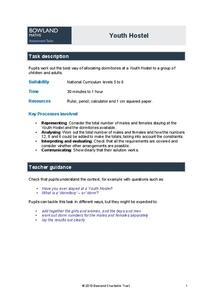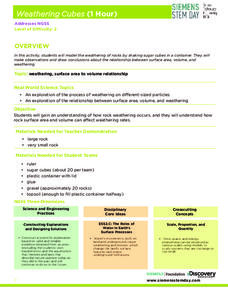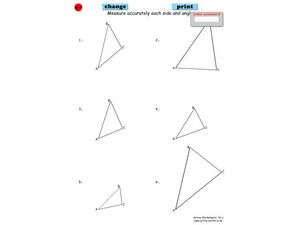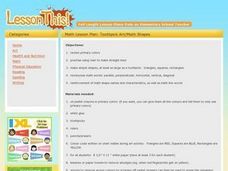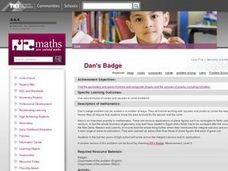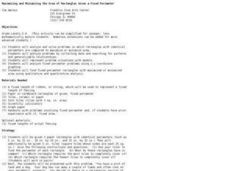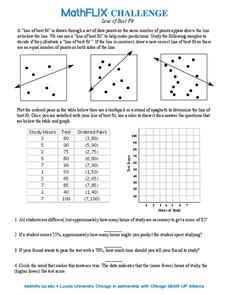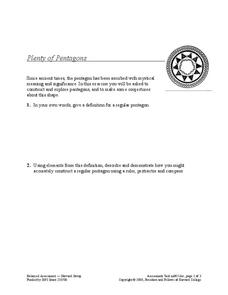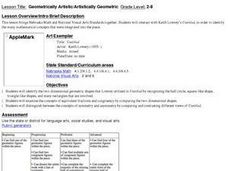Bowland
Youth Hostel
Given a set of criteria, individuals determine how to arrange males and females in a dormitory. They must meet the requirements and communicate their plan clearly.
Discovery Education
Weathering Cubes
Weathering is not necessarily a result of the weather. Scholars conduct an experiment to explore the effect of surface area and volume on the weathering process. They create their own sugar cube rocks using the same number of cubes—but...
Curated OER
Measuring angles and segments
In this middle school geometry worksheet, students use a ruler and a protractor to measure segment length and angle size. The one page worksheet contains six problems. Answers are not provided.
Curated OER
Toothpick Art
Students review primary colors and practice making straight lines. In this visual arts activity, students paint simple shapes as large as a toothpick, using specific primary colors. During the construction of the shapes students are...
Curated OER
Measurement Activity
In this geometry worksheet, students use a ruler and a protractor to measure the lengths of the line segments and size of the angles that make up a drawing of a Christmas tree. The one page worksheet has one problem. Answers...
Curated OER
Math Assessment
In this math worksheet, students complete the test that focuses upon the skills of completing basic calculations, fractions, and percentages.
Curated OER
Math Lesson Plan: Bread Bag Tabs: Patterning
Learners explore the concept of patterning. In this patterns lesson, students use recycled plastic tab closures as well as their problem solving skills to identify and create patterns.
Mathed Up!
3-D Pythagoras
Apply the Pythagorean Theorem in three-dimensional shapes. Young mathematicians watch a video that takes them through several examples of using the Pythagorean Theorem to solve problems involving lengths in three-dimensional figures. A...
Mathematics Vision Project
Module 6: Congruence, Construction, and Proof
Trace the links between a variety of math concepts in this far-reaching unit. Ideas that seem very different on the outset (like the distance formula and rigid transformations) come together in very natural and logical ways. This...
Curated OER
Dan's Badge
Students solve a math problem using area formulas of circles and squares. They read and discuss the problem, analyze images of badges, reconstruct the badge from the problem using circles and rulers, and share the solution with the class.
Curated OER
How Tall is that Tree?
Students use their feet to measure distance between themselves and a tree trunk. For this distance lesson, students use the number of steps, and string to measure distances and height of the tree. Students can get the tree...
EngageNY
The Angle-Angle (AA) Criterion for Two Triangles to Be Similar
What do you need to prove triangles are similar? Learners answer this question through a construction exploration. Once they establish the criteria, they use the congruence and proportionality properties of similar objects to find...
Curated OER
Maximizing and Minimizing the Area of Rectangles Given a Fixed Perimeter
Students explore the realms of measurement. In this math lesson plan, students analyze and solve problems in which rectangles with identical perimeters are compared to maximize or minimize area. This activity can be extended for algebra,...
Illustrative Mathematics
Are These Right?
Is that a right triangle or a wrong triangle? Young mathematicians look at eleven different shapes and use a measuring tool of their choice to determine which triangles have right angles. Consider cutting out sets of the shapes to...
Mathed Up!
Standard Form
Be sure your young mathematicians can work with scientific notation. Scholars first watch a video to review scientific notation. They then complete a learning exercise requiring conversions and operations with scientific notation.
Mathed Up!
Tree Diagrams
Explore how to visually represent probability problems. Scholars watch a video to refresh their memories on tree diagrams. To finish the activity, they complete a activity of questions on this topic.
Curated OER
Line of Best Fit
In this line of best fit learning exercise, students solve and complete 8 different problems that include plotting and creating their own lines of best fit on a graph. First, they study the samples at the top and plot the ordered pairs...
Illustrative Mathematics
A Midpoint Miracle
Young geometers develop one of the fundamental properties of quadrilaterals (connecting side midpoints gives a parallelogram) in this short but thought-provoking exercise. Using a combination of hands-on techniques and abstract algebraic...
Balanced Assessment
Plenty of Pentagons
Why are only four colors needed to color webs from regular pentagons, not five? An assessment task requires young mathematicians to first construct regular pentagons using a compass and straightedge, then has them consider a shape...
Balanced Assessment
Multi-Figures
Apply concepts of scale and ratio to determine relationships in irregular figures. Learners determine the ratio of the perimeters of two figures composed of rectangles and circles. After, they apply similar concepts to find the ratio of...
Corbett Maths
Constructing ASA Triangles
The narrator of a short video explains the steps in constructing a triangle given the measure of two angles and the length of the side between the angles. The resource provides opportunities for pupils to practice the skill with two...
Curated OER
Measuring Units and Tools
In this measurement activity, students determine which of 3 measurement tools would be used to answer 4 mathematical questions. Students circle their multiple choice answers and then draw or write an explanation for each answer.
Curated OER
Why Standard Units?
A variety of units of measurement are taught in this math worksheet. First, students measure objects using their hands. Then, they use a ruler to gain more precise measurements in meters and centimeters. Nice worksheet!
Curated OER
Geometrically Artistic/Artistically Geomtric
Students identify the two-dimensional geometric shapes Lowrey utilized in the painting Untitled. Students compare the two-dimensional shapes in terms of equivalent fractions, congruency, symmetry and asymmetry. Students create their own...
